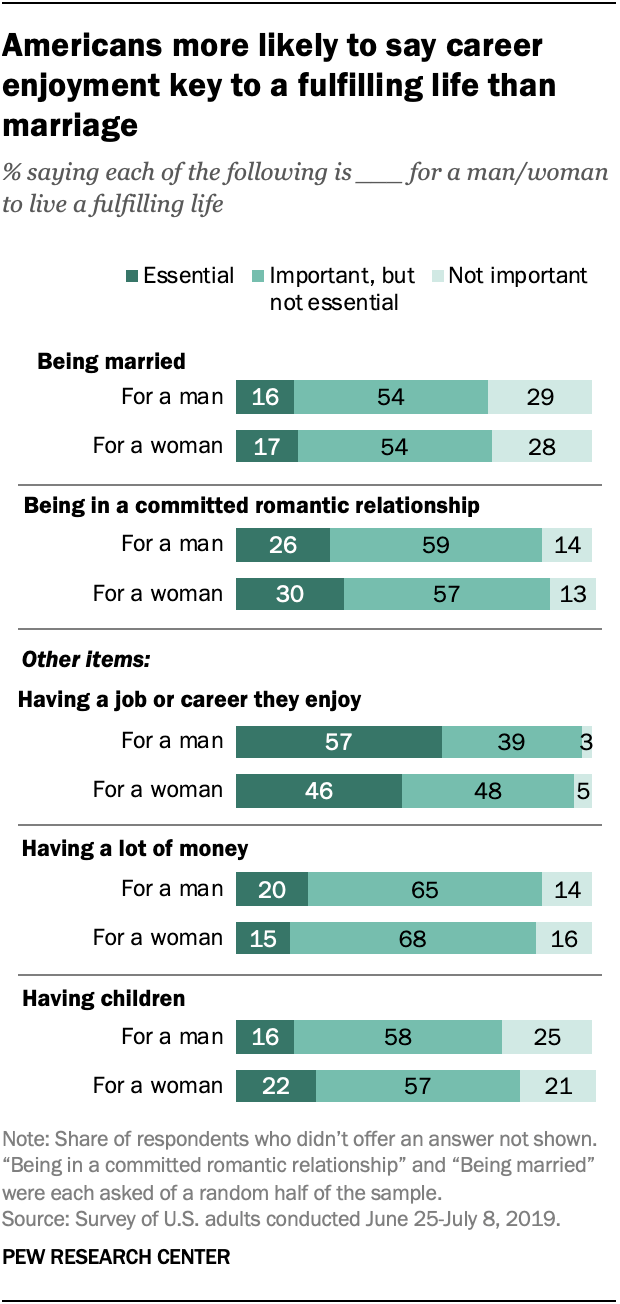

While Valentine’s Day is widely celebrated as a time for peak romance – and even marriage proposals – marriage isn’t the only way to achieve happiness and contentment for many Americans. Fewer than one-in-five U.S. adults say being married is essential for a man or a woman to live a fulfilling life, according to a Pew Research Center survey conducted in summer 2019.
Similar shares of adults say that marriage is essential for women (17%) and men (16%) to live fulfilling lives. A much larger share of Americans (54%) say being married is important but not essential for men and women to live fulfilling lives. And about three-in-ten say marriage is not important in this respect.
The public places somewhat more importance on being in a committed romantic relationship than being married. About one-in-four adults (26%) say being in such a relationship is essential for men to lead fulfilling lives, and 30% say the same about women. Again, though, much larger shares see this as important but not essential for men (59%) and women (57%). Fewer people see this as not important.
How we did this
This post draws on our report “Marriage and Cohabitation in the U.S.,” published in 2019. Data in this report was drawn from a survey conducted June 25 to July 8, 2019, of 9,834 respondents who are members of Pew Research Center’s American Trends Panel (ATP), an online survey panel that is recruited through national, random sampling of residential addresses. Recruiting ATP panelists by phone or mail ensures that nearly all U.S. adults have a chance of selection. This gives us confidence that any sample can represent the whole U.S. adult population (see our Methods 101 explainer on random sampling). To further ensure that each ATP survey reflects a balanced cross-section of the nation, the data are weighted to match the U.S. adult population by gender, race, ethnicity, partisan affiliation, education and other categories.
Here are the questions used for this report, along with responses, and its methodology.
So what do Americans consider more important to leading a fulfilling life than marriage and being in a committed relationship? They’re much more likely to point to career enjoyment. A majority (57%) say having a job or career they enjoy is essential for men to live a fulfilling life, and 46% say the same about women.
When asked how important it is for men and women to have a lot of money, 20% say this is essential for men and 15% say the same about women. But somewhat higher shares say money is important, though not essential, to fulfillment than say the same about marriage. When it comes to having children, 16% say this is essential for men to live a fulfilling life and 22% say it’s essential for women.
Perspectives about the role of marriage differ somewhat by age, gender and relationship status. For example, younger adults are more likely than their older counterparts to say that marriage is not important to a fulfilling life: 37% of adults younger than 30 say being married is not important for a man, compared with 30% of those ages 30 to 49, 27% of those 50 to 64, and 20% of those 65 and older. Younger adults are also more likely to say being married is not important for a woman to live a fulfilling life.
Women are somewhat more likely than men to say being married is not important for a woman to live a fulfilling life (31% vs. 24%). Women and men hold similar views about whether this is important for men.
Views on the role of marriage in a fulfilling life also differ among married and cohabiting adults. While about 40% of currently cohabiting adults say being married is not important for a man or woman to lead a fulfilling life, only 20% of married adults say the same.
When asked about the importance of being in a committed romantic relationship, again there are differences by age. About one-in-five adults younger than 30 (19%), compared with 9% of those 65 and older, say this is not important for a man to be fulfilled. The pattern is similar with regard to women.
Roughly equal shares of men (14%) and women (15%) say being in a committed romantic relationship is not important for a man to live a fulfilling life. The shares are relatively similar for women, too (12% of men and 14% of women said being in a committed romantic relationship is not important for women).
These findings come at a time when U.S. marriage rates, which had fallen steadily since 1960, have stabilized. In 2017, 50% of Americans ages 18 and older were married, down from 58% in 1990. At the same time, the share of Americans who have never been married has increased steadily in recent decades.
Note: Here are the questions used for this report, along with responses, and its methodology.
